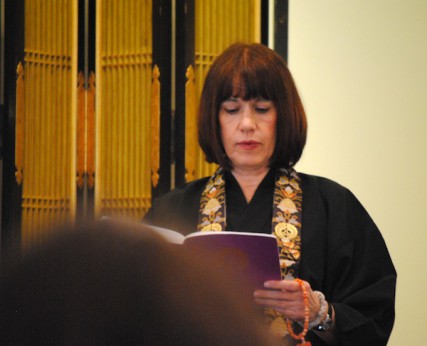
The Rev. Christine Marr once called herself a “book Buddhist.” She read about the faith and studied its philosophies, but didn’t belong to a sangha.
She didn’t know she needed one, she said.
That changed in the early 1990s, however, when she walked through the doors of the Spokane Buddhist Temple.
“I didn’t really understand the importance of having a temple and a sangha, so when I started going, I thought ‘Oh, I’ve really been missing out on something, a big piece’,” she said.
She immersed herself in the community and in a few months will be the only Buddhist in Spokane to hold a kyoshi certification, which means she’ll be the highest ranking Jodo Shinshu Buddhist in the city.
“This is significant because she doesn't have to be under the tutelage of someone, she can operate much more independently and so she'll have a level of authority Spokane hasn't had until now,” explained the Rev. Donald Castro, rinban (head minister) at the Seattle Betsuin Buddhist Temple.
Until now the Spokane Buddhist Temple, which is part of the Buddhist Churches of America, has been under Castro’s supervision.
To earn Kyoshi, Marr had to travel to Japan twice. Once in 2011 for Tokudo ordination, which she earned with Sensei Paul Vielle, who also leads the Spokane Buddhist Temple; and again last year to further study sacred chants and rituals. She is currently completing the Kyoshi Certificate Program at The Institute of Buddhist Studies in Berkeley, Calif.
“It shows a lot more education,” Castro said. “Her dedication is really wonderful…it’s quite an accomplishment.”
Marr said she never planned to climb the sacred ladder, but soon after she found a home at the temple, disaster struck, prompting her to become more involved in the sangha.
“I was so excited to have found it, and then it burned down,” she said.
In 1992 an arson fire ripped through the church, destroying it.
“What really got me into action was that the membership was elderly and I was afraid it (the sangha and temple) was going to disappear. So I asked to be on the building committee. I very much wanted to rebuild. I was frantic,” she said.
The community managed to raise the money needed to rebuild and in 1994 it was rededicated. After that Marr joined the temple board and re-started the newsletter, then became a ministers assistant in 2008.
“Doors opened and opportunities opened and that’s what led me here,” she said. “My goal has always been to keep Buddhism alive in Spokane, I have that on my mind and I know I’m on track; the sangha is growing, word is getting out, we’re advancing a lot. Before we were shrinking…there’s a lot of interest in Buddhism here, and I hope what I’m doing will contribute.”
Marr will complete her courses at the Institute of Buddhist Studies in December.
Castro said the Spokane Buddhist Temple is a “vibrant community” now, partly because it’s one of the only non-ethnically based temples in the state.
“It was really Christine’s involvement and leadership that opened up the temple, making it more non-ethnic. Other people started coming in, it was a very gradual process over the years. In a way I expect it to be a prototype or model for what might happen with temples in the rest of the U.S.,” Castro said.
The Spokane Buddhist Temple is run completely by volunteers, which also separates it from other temples.
Sangha services are Sundays at 10:30 a.m.









